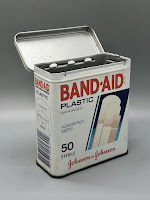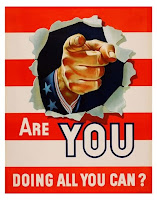“Band-Aid: A trademark for a type of adhesive bandage.”
– The Associated Press Stylebook
When I mention I’ve written for roleplaying games to average folks unfamiliar with the adventure gaming hobby (often called “mundanes” in fandom parlance) the inevitable reply almost always amounts to, “Oh, D&D.” Recent discussions about Hasbro/Wizards of the Coast drastically changing the Open Gaming License (with the advent of a new edition of Dungeons & Dragons) have noted we have many roleplaying games with various mechanics and settings, all of which have the potential to provide a satisfying game experience given the confluence of good gamemasters, players, and inspiration. It reminds me of the Band-Aid brand name falling into what some might consider a “generic trademark” usage in our society...yet many mundanes, and even some in the hobby community, use the specific brand name “D&D” when they mean roleplaying games. Words matter. I encourage people to get in the habit of using “roleplaying game,” “RPG,” and other equivalents when they don’t specifically mean D&D.
As
a writer and editor I
was taught only to use “Band-Aid” when referring to the specific
brand. Using such phrases as “putting a Band-Aid on it” and “a
Band-Aid solution” required brand capitalization lest I contribute
to diluting
the trademarked term in common language. “Adhesive bandage” was
preferable when specifically referring to its first aid usage, though
not as catchy in the instances mentioned above. Trademark
holders defend their brands against competitors using that
association for their own profit and
common usage lest the trademark become generic.
Writers
and editors mind their language to respect the trademark brand; while
most in publishing are tiny targets for Johnson & Johnson’s
wrath, some of us had superiors who were severely careful not to
disrespect the trademark.
Yes, I am old enough
to remember when
Band-Aids came
in tins.
D&D has quite the opposite issue as Band-Aid; no doubt its current corporate owners want D&D to remain synonymous with the concept of roleplaying games in the mind of the general public, though the company continues defending what it views as its intellectual property from those who claim compatibility with the D&D experience. Every time someone uses the specific name “D&D” when they mean “roleplaying games” further cements the brand as the only perceived aspect of that hobby. This usage in a way implicitly denies the existence of other roleplaying games while further cementing D&D as the only roleplaying game in the minds of the public.
Our roleplaying game experiences have various associations: with particular game mechanics and settings; with different groups of friends as player/gamemaster participants; with our characters and expectations; and with our group crafting stories at the table. Our gaming has inspired us to create our own materials (in some cases to share with or sell to others), including original games and ones derived from established titles and developed along innovative paths. Since the confluence of wargaming and medieval fan activities birthed roleplaying games in the 1970s (as examined by Jon Peterson in his landmark history Playing at the World), numerous games have come and gone, with the form evolving and branching to embrace a host of different play styles, game mechanics, and presentations. Some of us have and still play D&D; some experienced the adventure gaming hobby without once playing D&D. While it might dominate the market, D&D is only one part of a vast and diverse roleplaying game hobby.
(I will not debate the dominance of D&D in the roleplaying game market. Despite several solid competitors in its earliest days – I’m thinking of but not limiting myself to such pillars of the hobby as Traveller and Tunnels & Trolls – and a host of other popular games released since, it has garnered the majority market share of roleplaying games for most of its life [with the possible exception of Pathfinder during the life of fourth edition D&D]. The brand isn’t going away anytime soon. Though many upset by the Open Game License changes might hope otherwise.)
(All that said, I encourage everyone to explore other roleplaying game systems and settings. Just because D&D dominates the market doesn’t mean it’s a satisfying or perfect game for everyone all the time.)
A Band-Aid is an adhesive bandage, but not all adhesive bandages are Band-Aids. Although D&D is a roleplaying game, not all roleplaying games are D&D. D&D is just one brand in an ever-expanding universe of roleplaying game titles. Our language shapes our reality. It’s not easy resisting and correcting behaviors that have become cultural norms – especially relating to everyday language, since society views those who correct such errors as annoying pedagogues – but progressive portions of our society have raised awareness and sensitivity to various language usage issues. It’s part of our evolution as individuals and a greater community. Let’s not limit our vision by invoking “D&D” to represent the hobby; let’s relegate our use (if we must) only when referring to the specific brand. As the adventure gaming hobby continues to grow I encourage everyone to refer to our vast pastime as “roleplaying games” or “RPGs” as a wider recognition of the volume and diversity of such games available today.
“Whatever words we utter should be chosen with care for people will hear them and be influenced by them for good or ill.”
– Buddha
Caption: I am old enough to remember when Band-Aids came in tins.


No comments:
Post a Comment
We welcome civil discussion and polite engagement. We reserve the right to remove comments that do not respect others in this regard.